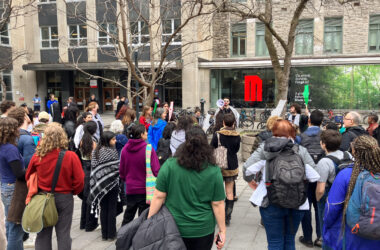 ipolitics.ca
ipolitics.caOn September 12, NDP President Brian Topp launched his campaign for leadership of the New Democratic Party of Canada. Topp’s announcement kick-started the leadership race to select a Leader of the Opposition, who will be elected at a leadership convention in March 2012.
Topp graduated with a BA from McGill ’83 and chaired an NDP campaign in 1988. After a few years in Saskatchewan’s provincial politics, he returned to the federal stage, most recently serving as Jack Layton’s Senior Advisor during the 2011 election campaign. This past June, Topp was elected party president.
Topp’s background shows his skill at organizing on both the party and government level, explained Richard Schultz, Chair of the McGill Department of Political Science and an expert in Canadian politics.
“Topp seems to have incredible experience in terms of not just the backroom of the NDP but also working with the government, in particular the government of Saskatchewan,” Schultz said. “More so than Pierre Trudeau or Brian Mulroney [at the time of their election as party leaders], he’s familiar with how decisions are made and the difficulties of making decisions.”
Jimmy Gutman, U1 Canadian Studies, is a member of NDP McGill and noted that although Topp has demonstrated strong leadership in the past, his position in the race is hard to evaluate without knowing who he is running against.
“He had support one time and he might have it again,” Gutman said. “But we don’t have all the names yet, so it’s hard to give a holistic judgment of the leadership race.”
For Schultz, Topp’s lack of experience within the House of Commons as an elected Member of Parliament is a drawback.
“My preference is for people to have been elected and served in the House of Commons before becoming party leader,” Schultz said. “Like in the case of Trudeau or Mulroney, the impression that you don’t have to be a Member of Parliament [to be party leader] suggests that parliament is not that important, and I think parliamentary experience should be important.”
To fill the power vacuum left by Layton, an ideal candidate for the NDP would need to be fully bilingual and appeal to the average voter, both Schultz and Gutman said.
“The ideal candidate also has to have the skin of a crocodile, because the Conservatives are nasty fighters,” Schultz added. “Already, they are trying to label Topp as a tool of the union movement and to portray him as a man who represents only minority interests. [The next NDP leader] will need to be thick-skinned and willing to fight hard.”
In the interim, the main challenge for the NDP will be avoiding polarization within the party. The leadership contest could potentially lead to party members differing in their policy suggestions.
“The key thing for a political party in the opposition is that it not be taking three or four positions on any one issue, because the government would pounce on them and show that they’re divided and not capable of governing,” Schultz said. “So it’s going to be very important for them over the next six months to be as coherent and united as possible. In the House of Commons they’re going to have to speak as much as possible with one voice.”
McGill alumnus and recently elected NDP MP Matthew Dubé acknowledged the need for party unity during the leadership race.
“I think that at the end of the day, our goal is to make sure that, rather than be something divisive, this is a discussion of ideas,” he said. “No matter which candidate you support or who endorses who, everyone’s goal is to form an NDP government in four years.”








